
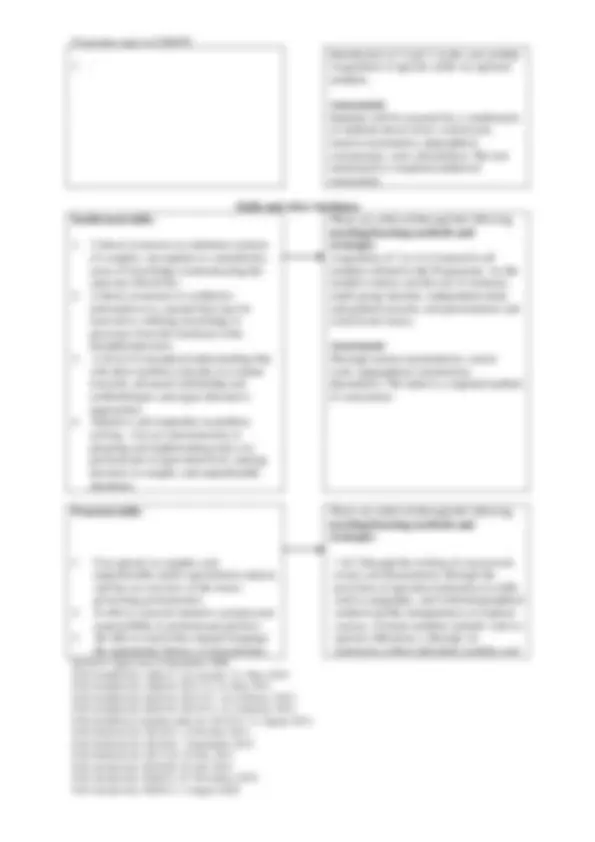
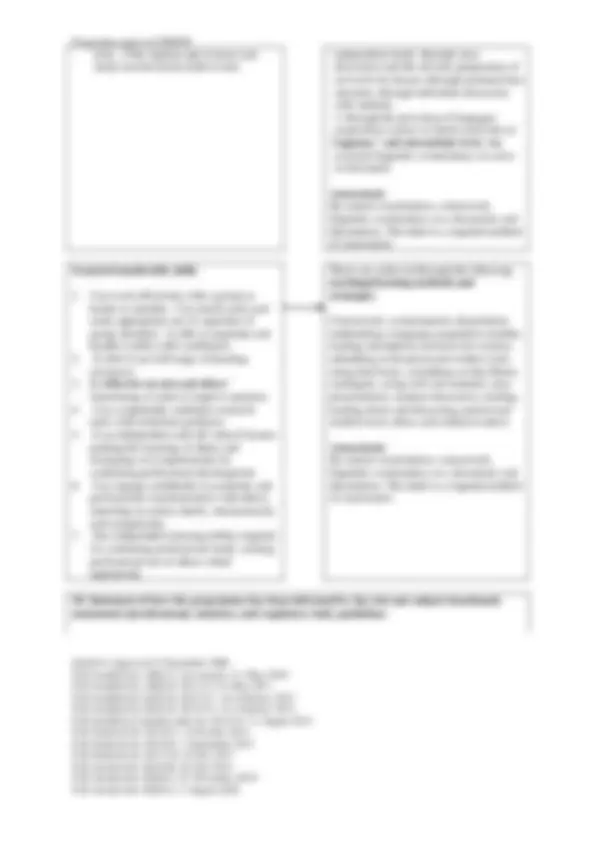

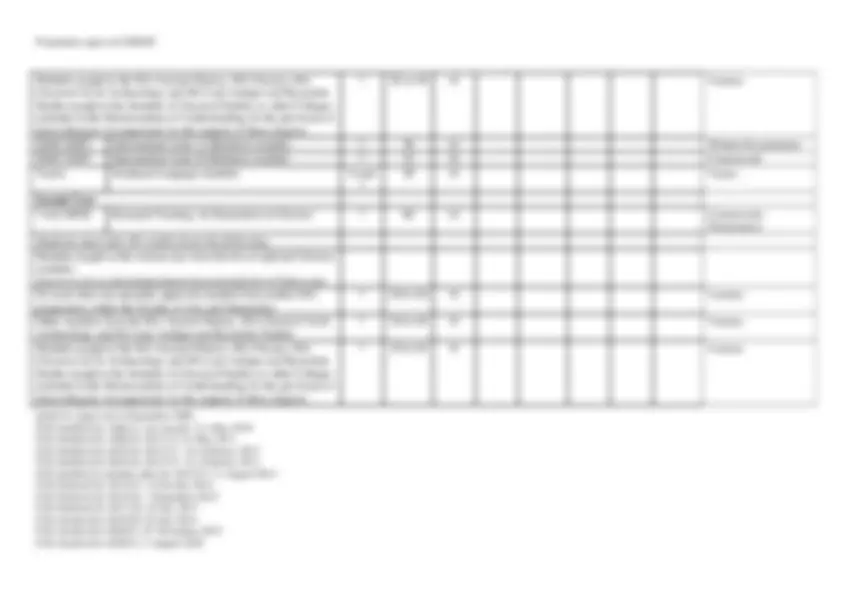
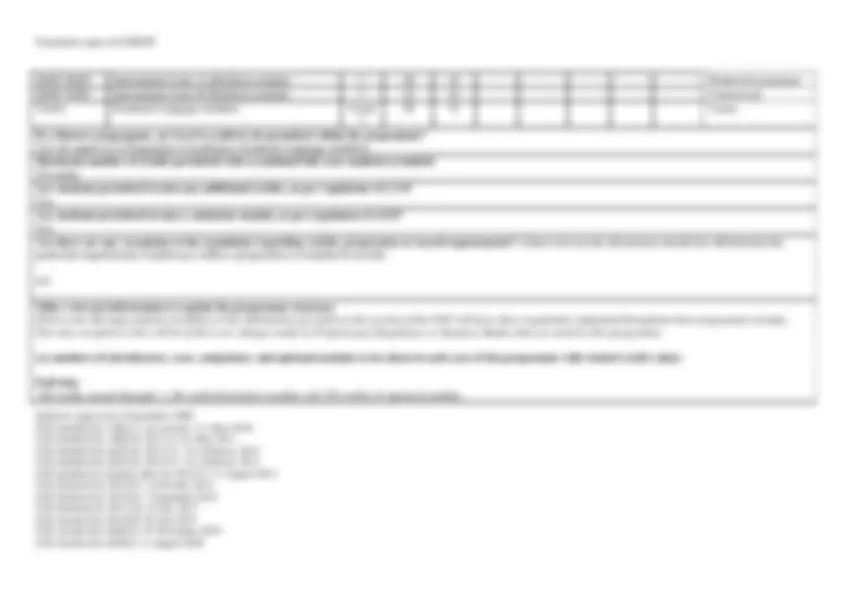
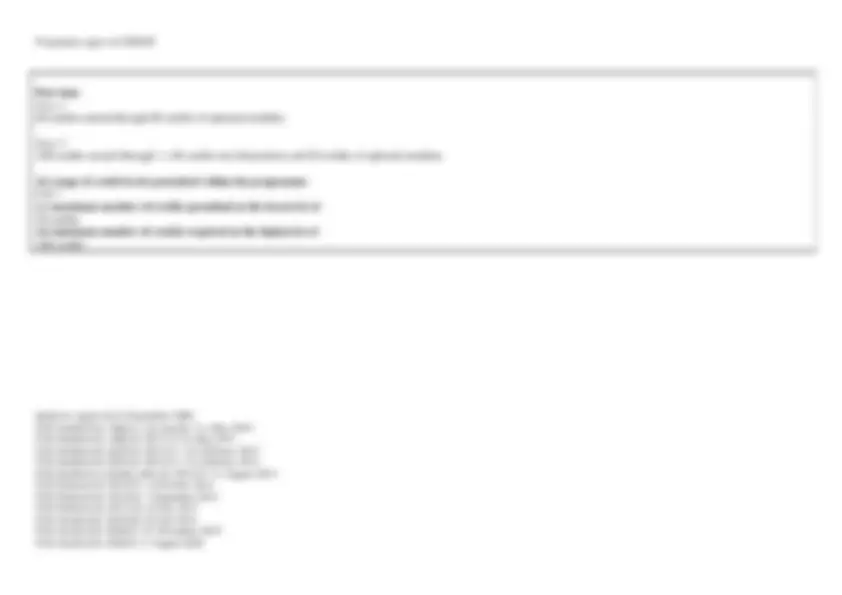


Study with the several resources on Docsity

Earn points by helping other students or get them with a premium plan


Prepare for your exams
Study with the several resources on Docsity

Earn points to download
Earn points by helping other students or get them with a premium plan
Community
Ask the community for help and clear up your study doubts
Discover the best universities in your country according to Docsity users
Free resources
Download our free guides on studying techniques, anxiety management strategies, and thesis advice from Docsity tutors
Information about the Classics MA programme at King's College London, including attendance modes, minimum and maximum programme lengths, assessment methods, and module details. The document also outlines the programme structure, credit requirements, and marking criteria.
What you will learn
Typology: Schemes and Mind Maps
1 / 11

This page cannot be seen from the preview
Don't miss anything!







QA&AA Approved: 8 September 2009 PAF modified by ASQ re: exit awards: 21st May 2010 PAF modified by ASQ for 2011/12: 9th May 2011 PAF modified by QAS for 2012/13: 13th February 2012 PAF modified by QAS for 2014/15: 12th February 2014 PAF modified re module table for 2014/15: 7th August 2014 PAF finalised for 2014/15: 14 October 2014 PAF finalised for 2015/16: 7 September 2015 PAF finalised for 2017/18: 25 July 2017 PAF checked for 2019/2 0 : 29 July 2019 PAF checked for 2020/21: 07 November 2019
1. Programme title and designation Classics 2. Final award Award Title Credit Value
equivalent Any special criteria MA Classics 180 90 N/A
3. Nested awards Award Title Credit Value
equivalent Any special criteria N/A N/A N/A N/A N/A
4. Exit awards Award Title Credit Value
equivalent Any special criteria PGDip Arts & Humaniti es (Classics)
PG Cert Arts & Humaniti es (Classics)
5. Level in the qualifications framework M 6. Attendance Full-time Part-time Distance learning Mode of attendance X X N/A Minimum length of programme 1 year 2 years N/A Maximum length of programme **3 years 4 years N/A
QA&AA Approved: 8 September 2009 PAF modified by ASQ re: exit awards: 21st May 2010 PAF modified by ASQ for 2011/12: 9th May 2011 PAF modified by QAS for 2012/13: 13th February 2012 PAF modified by QAS for 2014/15: 12th February 2014 PAF modified re module table for 2014/15: 7th August 2014 PAF finalised for 2014/15: 14 October 2014 PAF finalised for 2015/16: 7 September 2015 PAF finalised for 2017/18: 25 July 2017 PAF checked for 2019/2 0 : 29 July 2019 PAF checked for 2020/21: 07 November 2019
11. UCAS code (if appropriate) N/A 12. Relevant QAA subject benchmark/ Professional, statutory and regulatory body guidelines N/A. No relevant M-level statement 13. Date of production of specification October 2008 14. Date of programme review 2016/ 16. Educational aims of the programme i.e what is the purpose of the programme and general statements about the learning that takes place over the duration of the programme The following learning outcomes are applicable to all awards. The programme aims to allow graduate students to study in depth key aspects of the languages, literatures and cultures of Greece and Rome. It also aims to equip students with the tools for further research developing their critical and conceptual understanding in the field. 17. Educational objectives of the programme/programme outcomes (as relevant to the SEEC Credit Level Descriptors) The programme provides opportunities for students to develop and demonstrate knowledge and understanding and skills in the following areas: Knowledge and understanding The programme provides a knowledge and understanding of the following:
QA&AA Approved: 8 September 2009 PAF modified by ASQ re: exit awards: 21st May 2010 PAF modified by ASQ for 2011/12: 9th May 2011 PAF modified by QAS for 2012/13: 13th February 2012 PAF modified by QAS for 2014/15: 12th February 2014 PAF modified re module table for 2014/15: 7th August 2014 PAF finalised for 2014/15: 14 October 2014 PAF finalised for 2015/16: 7 September 2015 PAF finalised for 2017/18: 25 July 2017 PAF checked for 2019/2 0 : 29 July 2019 PAF checked for 2020/21: 07 November 2019 texts , if the student opts to learn and study ancient Greek and/or Latin. independent study; through class discussion and the advance preparation of set work for classes; through seminar/class structure; through individual discussion with students.
QA&AA Approved: 8 September 2009 PAF modified by ASQ re: exit awards: 21st May 2010 PAF modified by ASQ for 2011/12: 9th May 2011 PAF modified by QAS for 2012/13: 13th February 2012 PAF modified by QAS for 2014/15: 12th February 2014 PAF modified re module table for 2014/15: 7th August 2014 PAF finalised for 2014/15: 14 October 2014 PAF finalised for 2015/16: 7 September 2015 PAF finalised for 2017/18: 25 July 2017 PAF checked for 2019/2 0 : 29 July 2019 PAF checked for 2020/21: 07 November 2019 There is no subject benchmark at Masters level for Classics. The subject content of the programme is informed by the description of programmes in ancient history in the honours level subject benchmark for classics and ancient history.
19. In cases of joint honours programmes please provide a rationale for the particular subject combination, either educational or academic N/A Which is the lead department and/or School?
QA&AA Approved: 8 September 2009 PAF modified by ASQ re: exit awards: 21st May 2010 PAF modified by ASQ for 2011/12: 9th May 2011 PAF modified by QAS for 2012/13: 13th February 2012 PAF modified by QAS for 2014/15: 12th February 2014 PAF modified re module table for 2014/15: 7th August 2014 PAF finalised for 2014/15: 14 October 2014 PAF finalised for 2015/16: 7 September 2015 PAF finalised for 2017/18: 25 July 2017 PAF checked for 2019/2 0 : 29 July 2019 PAF checked for 2020/21: 07 November 2019 No more than one specially approved module from another MA programme within the Faculty of Arts and Humanities 7 20 or 40 O Various Other modules from the MA Ancient History, MA Classical Art & Archaeology and MA Late Antique and Byzantine Studies 7 20 or 40 O Various Modules taught in the MA Ancient History, MA Classics, MA Classical Art & Archaeology & MA Late Antique & Byzantine Studies taught at the Institute of Classical Studies or other Colleges included in the Memorandum of Understanding for the provision of Intercollegiate Arrangements for the support of these degrees. 7 20 or 40 O Various SSHC266S7 Intermediate Latin A (Birkbeck module) 7 30 O Written Examination SSHC349S7 Intermediate Latin B (Birkbeck module) 7 15 O Coursework Varies Graduate Language modules 6 and 7 20 O Varies Part-time Study First Year
Modules taught in the current year from the list of optional Classics modules: http://www.kcl.ac.uk/artshums/depts/classics/modules/level7/index.aspx 7 20 or 40 No more than one specially approved module from another MA programme within the Faculty of Arts and Humanities 7 20 or 40 O Various Other modules from the MA Ancient History, MA Classical Art & Archaeology and MA Late Antique and Byzantine Studies 7 20 or 40 O Various
QA&AA Approved: 8 September 2009 PAF modified by ASQ re: exit awards: 21st May 2010 PAF modified by ASQ for 2011/12: 9th May 2011 PAF modified by QAS for 2012/13: 13th February 2012 PAF modified by QAS for 2014/15: 12th February 2014 PAF modified re module table for 2014/15: 7th August 2014 PAF finalised for 2014/15: 14 October 2014 PAF finalised for 2015/16: 7 September 2015 PAF finalised for 2017/18: 25 July 2017 PAF checked for 2019/2 0 : 29 July 2019 PAF checked for 2020/21: 07 November 2019 Modules taught in the MA Ancient History, MA Classics, MA Classical Art & Archaeology and MA Late Antique and Byzantine Studies taught at the Institute of Classical Studies or other Colleges included in the Memorandum of Understanding for the provision of Intercollegiate Arrangements for the support of these degrees. 7 20 or 40 O Various SSHC266S7 Intermediate Latin A (Birkbeck module) 7 30 O Written Examination SSHC349S7 Intermediate Latin B (Birkbeck module) 7 15 O Coursework Varies Graduate Language modules 6 and 7 20 O Varies Second Year 7AACM950 Research Training & Dissertation in Classics 7 60 Cr Coursework; Dissertation
Modules taught in the current year from the list of optional Classics modules: http://www.kcl.ac.uk/artshums/depts/classics/modules/level7/index.aspx No more than one specially approved module from another MA programme within the Faculty of Arts and Humanities 7 20 to 40 O Various Other modules from the MA Ancient History, MA Classical Art & Archaeology and MA Late Antique and Byzantine Studies 7 20 to 40 O Various Modules taught in the MA Ancient History, MA Classics, MA Classical Art & Archaeology and MA Late Antique and Byzantine Studies taught at the Institute of Classical Studies or other Colleges included in the Memorandum of Understanding for the provision of Intercollegiate Arrangements for the support of these degrees. 7 20 to 40 O Various
QA&AA Approved: 8 September 2009 PAF modified by ASQ re: exit awards: 21st May 2010 PAF modified by ASQ for 2011/12: 9th May 2011 PAF modified by QAS for 2012/13: 13th February 2012 PAF modified by QAS for 2014/15: 12th February 2014 PAF modified re module table for 2014/15: 7th August 2014 PAF finalised for 2014/15: 14 October 2014 PAF finalised for 2015/16: 7 September 2015 PAF finalised for 2017/18: 25 July 2017 PAF checked for 2019/2 0 : 29 July 2019 PAF checked for 2020/21: 07 November 2019 Part time Year 1 80 credits earned through 80 credits of optional modules. Year 2 100 credits earned through 1 x 60 credit core dissertation and 40 credits of optional modules. (b) range of credit levels permitted within the programme 6 & 7 (c) maximum number of credits permitted at the lowest level 20 credits (d) minimum number of credits required at the highest level 160 credits
QA&AA Approved: 8 September 2009 PAF modified by ASQ re: exit awards: 21st May 2010 PAF modified by ASQ for 2011/12: 9th May 2011 PAF modified by QAS for 2012/13: 13th February 2012 PAF modified by QAS for 2014/15: 12th February 2014 PAF modified re module table for 2014/15: 7th August 2014 PAF finalised for 2014/15: 14 October 2014 PAF finalised for 2015/16: 7 September 2015 PAF finalised for 2017/18: 25 July 2017 PAF checked for 2019/2 0 : 29 July 2019 PAF checked for 2020/21: 07 November 2019
21. Marking criteria The assessment criteria follow the College’s general criteria for the assessment of MA programmes. 22. Particular features of the programme which help to reduce the barriers experienced by disabled students and ensure that the programme is accessible to all students who meet the entry requirements Structure We welcome part time applications. Publicity and programme handbook These clearly communicate the key skills that will be required during the programme, the content of each module, the intended teaching methods to be used and the module’s status (core/compulsory/optional). Teaching methods A wide range of teaching methods are utilised (as demonstrated by box 17), including: handouts in alternative formats, electronic resources placed on the website, lecture notes in advance in electronic formats and transcriptions available for outside speakers and films. Assessment Advice has been taken from the Equality and Diversity Department to ensure assessment methods do not unfairly discriminate against students with disabilities. The College’s Special Examination Arrangements Committee (SEAC) considers requests for adjustments to assessment to take account of learning and/or physical disabilities. Module outlines specify the assessment methods that will be used and explain that SEAC will need to be notified about requests for alternative assessment methods. The form that the alternative assessment will take has been specified for each module in advance. Feedback Feedback on the programme is regularly collected from students, including information from students with disabilities about their learning experience. The information collected is used towards the on- going development and improvement of the programme. In particular, it has prompted closer working with ISS to ensure that subject resources are offered in a range of alternative formats wherever possible.